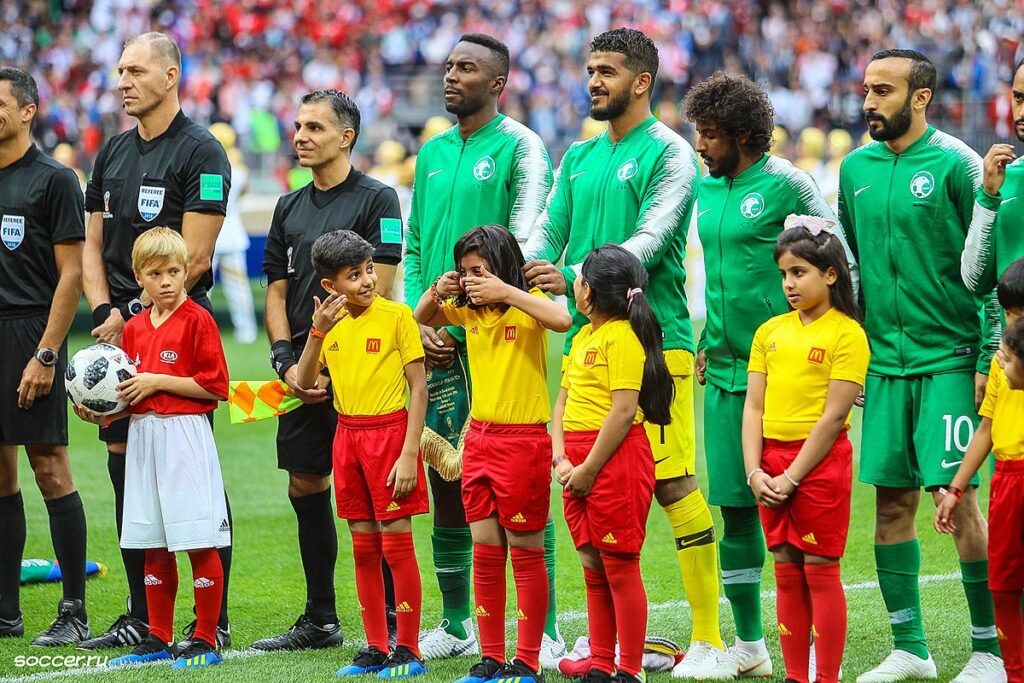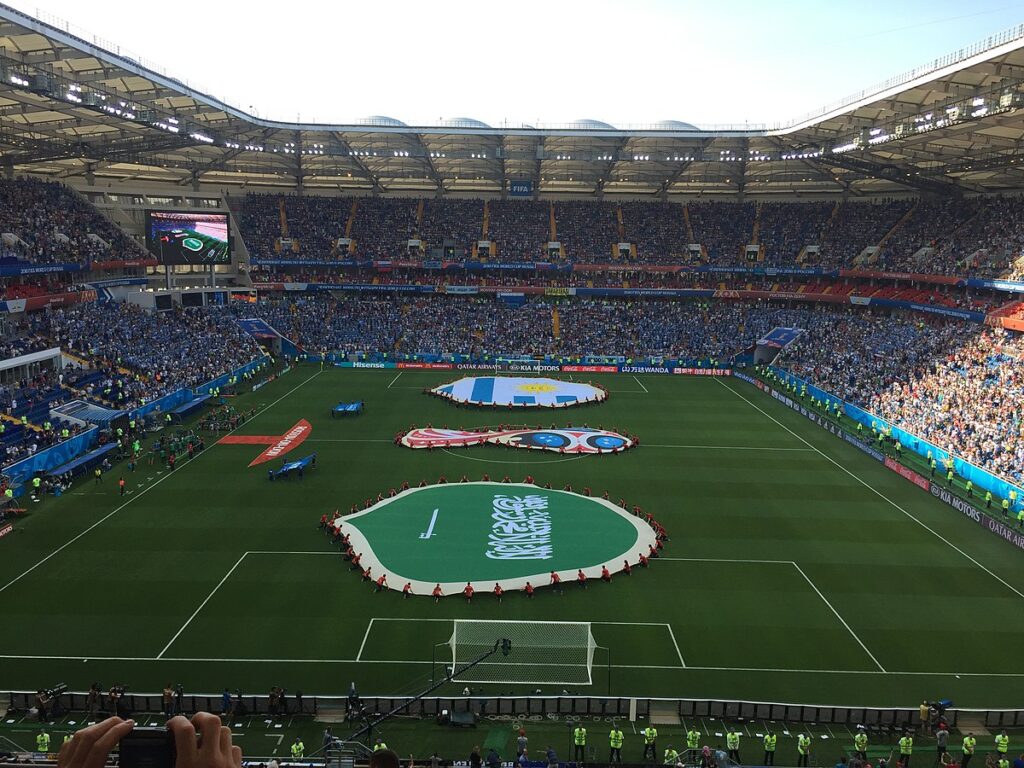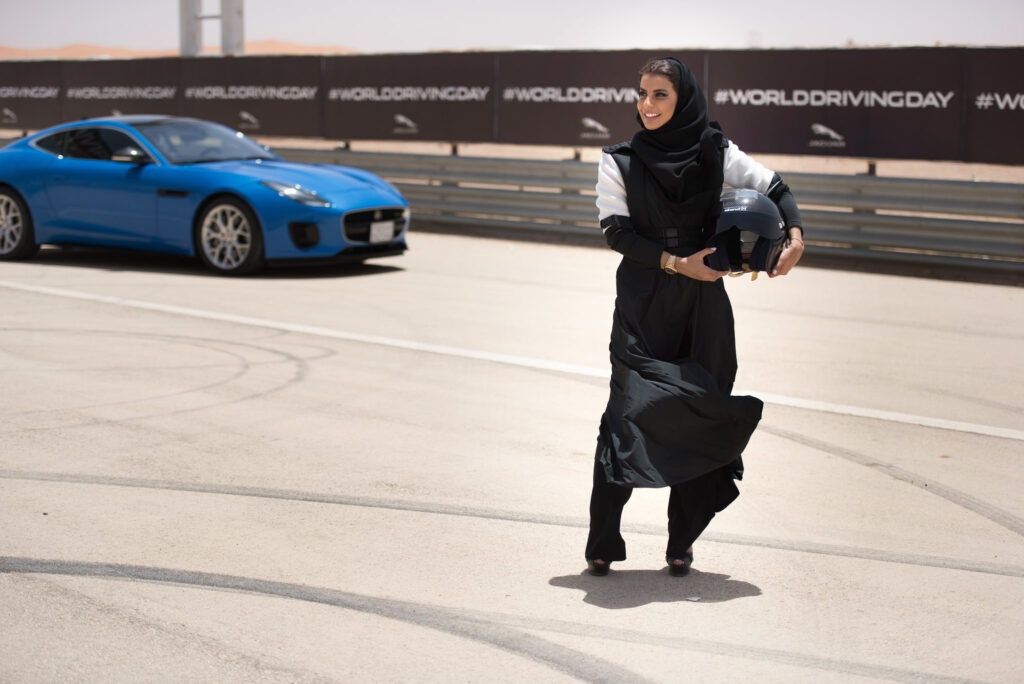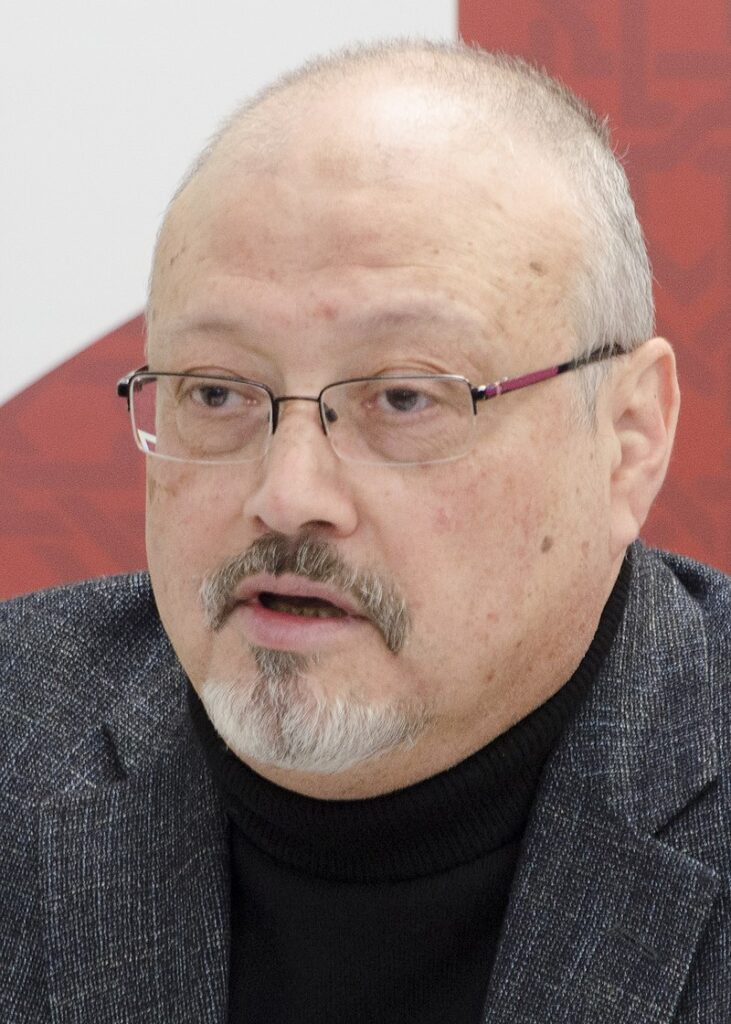
Football is a behemoth. The world’s biggest, most celebrated, and most culturally impactful sport saw a staggering 1.5 billion people tune in to the final of Qatar ‘22. The unprecedented global reach of the sport however, is, unfortunately, increasingly a vessel exploited by those seeking to gain something on both a personal and political level, and—from bribe-taking and match fixing, to using football as a propaganda piece—the sport is often plagued by controversy.
FIFA, world football’s governing body who control hosting rights to the World Cup, has long been implicated in a myriad of allegations relating to corruption. In 2015, the US indicted 14 current and former FIFA officials and associates on charges of “rampant, systemic, and deep-rooted corruption”. Sepp Blatter, FIFA’s former president, and Michel Platini, former FIFA advisor and French football legend, remain in the midst of a court case regarding fraud and corruption, 10 years after Blatter resigned from his position over similar allegations. Both presidents succeeding Blatter, Issa Hayatou and Gianni Infantino respectively, have faced similar allegations—from heavy implication in a plethora of bribery scandals, to having criminal proceedings opened up against him on suspicions of secrecy violations and abuse of office.
Given FIFA’s chequered past and opaque decision-making, it comes as little surprise that the decision to award the 2034 World Cup to Saudi Arabia raised eyebrows. An unprecedented fast-tracked bidding process afforded Australia—the only serious competitor meeting FIFA’s infrastructure and continental requirements—little time to prepare a challenge, effectively gifting hosting rights to the Gulf State. FIFA’s rules regarding World Cup bids do not allow for continents to host consecutive tournaments—a reform made to allegedly ensure a fairer distribution of the tournament across different regions. The decision to award the 2026 World Cup to North America, followed by the ludicrous six-nation hosting arrangement for 2030, in conjunction with lacklustre transparency regarding bidding processes, has invited a great deal of scrutiny into FIFA’s business dealings.
The Arabian peninsula, in recent times, has firmly nested itself as a de facto third place for major global sporting events. Football, in particular, has already had its fair share of tournaments—both national and international—auctioned off at eye-wateringly high costs, to those with a seemingly endless influx of oil-backed wealth.
Both the Spanish and Italian supercups had their hosting rights sold to Saudi Arabia, with the latter having had four in the Gulf state already. Although these matches are considered relatively insignificant domestic tournaments, therein lies a clear intention from Saudi Arabia to expand their influence within world football. Additionally, Saudi Arabia secured hosting rights for both the 24/25 and the 25/26 Asian Champions League finals, as well as the 2027 Asian Cup. The most contentious decision, however, was to let the Saudis host a women’s international friendly tournament—as it was not until 2018, merely five years before the tournament, that women were granted the right to enter sports stadiums.
As highlighted within Saudi Vision 2030, the Gulf State has sought out economic diversification, with sports being emphasised as a driving force in this shift. Defenders of the plan argue the investments are purely to enrich Saudi Arabia’s economic prospects, with a move away from oil reliance becoming increasingly necessary, as supplies diminish and demand dwindles.
Indeed, few would dispute that the Kingdom has made strides in opening up its economy. However, Paul Widdop, Associate Professor of Sport Business at Manchester Metropolitan University, believes that the Vision 2030 plan “gives them cover to call this economic diversification,” claiming that “what they’re really buying is cultural relevance.” He adds that there is “this growing convergence between sports and entertainment… and Saudi Arabia has clearly noticed the same trend.” Widdop further highlights the perceived “contradiction between their traditional values and their desired modern global image,” emphasising how sport is “… universal enough to cross boundaries while still allowing for controlled messaging.” For Saudi Arabia, football acts as the perfect vessel to clean up what most would consider a sub-par global image.

Miguel Delaney, football journalist and author of: States of Play: How Sportswashing Took Over Football, describes Saudi Arabia 2034 as “almost the culmination of the sportswashing era.” He argues that Saudi investment in football will soon surpass anything we’ve seen before, “which is saying something given what we’ve witnessed over the past two decades.”
“It’s also worth stating that Saudi plans are of course an evolution and updating of what Qatar, UAE and Russia did before. The gravitational effect is going to be much, much greater, though,” he adds. Said impact is already being felt at both club and international levels.
A prime example of such expansion being the Saudi-backed DAZN deal, which funds the Club World Cup. “You only have to look at the way Saudi money is indirectly funding the Club World Cup… The money on offer for that tournament is going to start to change the sport, and many in football fear it’s going to be the start of an era where we move away from domestic leagues and traditional structures.” Ultimately, Delaney warns: “Above anything, of course, Saudi Arabia is too big an influence for sporting authorities to properly regulate.”
An extension of said influence, is the ability to go against what is considered the ‘norm’ within western footballing rituals. “Plenty of fun can be had without alcohol,” Prince Khalid bin Bandar Al Saud, the Saudi Ambassador to the UK, said when talking to LBC regarding the impacts the nation’s Islamic culture, and the impact on their hosting abilities. As a standalone policy, an alcohol-free football event isn’t an inherently bad thing and, in fact, given the turbulent history of football hooliganism in Europe and South America, may be beneficial for the overall safety of the tournament. “We don’t want to change our culture for someone else, OK?” he adds, unfazed by the pressing nature of the question—a sentiment reflected in the political choices of Al Saud’s nation.
Saudi Arabia’s strict approach to alcohol is just one example of its broader policy of state control—one that governs many facets of day-to-day life. Take the case of Salma al-Shehab, for example. A Saudi national studying for a PhD in the UK, she was detained when holidaying in her home country, and sentenced to 34 years in prison for following and retweeting activists and dissidents on X. Al-Shehab was reported by a user on the Saudi-based crime-reporting app Kollona Amn, roughly translating to We Are All Security.
Moreover, Absher is a government-based app allowing husbands to track the movements of their wives, and notifies them if they try to use their passport at the border. So, as Western football fans are told to respect local customs and forgo the ability to make personal choices, they are, in doing so, being mandated to turn a blind eye to the invasive and oppressive practices employed by the Saudi government, and despite FIFA’s claims that host nations must now adhere to human rights principles, its history suggests otherwise.
Following the tragic deaths of a great number of migrant workers in the lead-up to Qatar ‘22, FIFA now mandates bidding nations conduct independent human rights assessments. Within their evaluation report, it’s claimed that: “As part of the Human Rights Strategy, the bidder commits to ensuring a secure and inclusive tournament environment free from discrimination through the implementation of policies, procedures and educational measures to address discrimination in the tournament context.” However, the report fails to explicitly outline these measures. It is also important to note that no action was undertaken by FIFA following the avoidable and innumerable human cost resultant from Qatar ‘22.
As such, non-profit organisations, including Human Rights Watch, continue to express concern over FIFA’s commitment to its human rights principles, and fear a repeated cost to life surrounding Saudi Arabia ‘34. Furthermore, Amnesty International called for Saudi Arabia’s uncontested bid to be halted, unless drastic human rights reforms were announced. No such action was undertaken by FIFA. Moreover, the bid was deemed “medium risk” for human rights, sparking further outrage. In 2024, the year FIFA’s report was released, at least 338 people were executed by the Gulf State.
Despite this, Saudi national and avid football fan Hossam Danish believes the Kingdom’s push into global football has coincided with tangible societal change. “Ten to 20 years ago you’d rarely see women going out without [a] hijab for example,” he explains. “Wearing shorts in public wasn’t even allowed for men.”
To those from the outside in, these changes may seem relatively superficial. But to those experiencing a real-time increase in their freedoms, small changes can make all the difference. Hossam highlights women being given the right to drive and a relaxed dress code being introduced, and emphasises that such reforms are beneficial to Western visitors unfamiliar with the customs of the country. “Less restrictions on dress codes and appearance—which also helps tourists coming from the west who don’t want to wear [a] hijab or cover tattoos,” he adds.

Although, despite these incremental freedoms, tight control remains exhibited on fundamental rights—particularly regarding free speech and political dissent. Critics argue that whilst the government commits to demonstrating progress to the world, its deeper human rights abuses continue largely unchallenged.
However, it would be a disservice to the Saudi government to disregard the positives that have come about due to their expanding footballing presence. The Kingdom’s recent changes signify a shift, however incremental, toward progress. Such reforms, although still limited, demonstrate the potential for change in a country dictated in its decision making by rigid cultural norms. For such a nation so firm in its beliefs, hosting a women’s friendly tournament, however symbolic that may be, represents a positive shift in attitude. However, such reforms remain mired in politics, with restrictions on fundamental freedoms—including free speech—staying heavily restricted.

Such rights were, at one time, unimaginable, and should be viewed as indication that change is possible. Although as positive as these actions may be, they should not be seen as an end to the ongoing struggle for equality. Rather, they should be viewed as building blocks upon which the foundations of a more equal society can be laid. True progress requires a sustained commitment to ensuring that human rights are respected, and the Kingdom’s internal laws evolve to embrace both equality and freedom for all its citizens. For all the positive change, Saudi Arabia has failed to demonstrate a sustained commitment to reform. The extrajudicial killing of journalist Jamal Khossigi serves as a poignant reminder of this fact.
There is a common refrain from those fatigued by the intersection of politics and football: “Can’t we just focus on the game?” But this ignores the reality that football has always been a beacon of politics. From FIFA’s past complicity in apartheid-era South Africa, to players taking a knee against racial injustice, the sport has long been a reflection of broader societal struggles. The key difference now is that football is not merely a battleground for activism—it serves as a powerful tool for authoritarian regimes to reshape their public image. Turning your back on this reality does not depoliticise football; it simply allows these regimes to dictate their future unchallenged.
